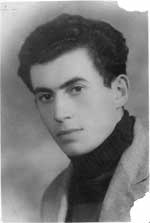The power of one. This was the message Bill Basch delivered at the 13th annual Wallenberg Lecture Oct. 28, and a concept he has embodied throughout his courageous life.
.jpg)
“Each one of us must do our share of improving our society one day at a time,” said Basch, a survivor of the Holocaust whose story was told in the Academy Award-winning documentary “The Last Days.” “We all have the ability to defeat evil in our own way.”
Basch’s chance to do this came when he joined Raoul Wallenberg’s underground movement in Budapest, Hungary, during World War II. At the time Basch was a 16 year old living on the streets.
“I was eager to help,” he said. “I knew the work would be dangerous, but I wanted to be part of something important.”
Within the underground movement, Basch produced and delivered forged Swedish passports, or schutzpasse, to thousands of Jews living in the 31 Wallenberg safe houses throughout Budapest. In order to deliver the schutzpasse undetected by the police, Basch learned to navigate the sewer system and other underground passages below the city.
“Fear had to remain in my remote consciousness, because those that showed fear were easily caught,” Basch said.
Upon reaching the safe houses, Jews who had not received the passes pleaded with Basch to come back with more.
“I never said no,” he said. “They were only worthless pieces of paper with a stamp and green and blue ink, yet these were a license to live.”
Basch’s work with the underground came to an abrupt end when he successfully evaded police by blending in with a large crowd of Jews waiting to be sent to Buchenwald.
“Anything was better than being shot,” he said. “I thought, I escaped before, I’ll escape again.’ But escape was impossible.”
Basch was loaded on to a cattle car with the others and spent five horrific days in the car before reaching the camp. “There was no food, no water for us. The stench was unbearable,” he said.
He and others made two attempts to escape through a small window in the car, with each attempt leading to the immediate death of the prisoners who made it outside. “I decided to concentrate on living first, and then escaping,” Basch said.
Once at Buchenwald, Basch’s survival instincts kicked in again when he volunteered to be on a crew that was repairing bombed railroad tracks.

“The only way to survive was to work and keep working,” he said. “I realized if I didn’t I would soon be dead.”
Working on the railroads did not guarantee safety, however, and after three months, the 500 men who started on the crew had been decimated to only a few dozen.
“When they [Americans] saw people fixing the same railroad they had just bombed, they opened on us with machine guns thinking we were Germans,” Basch said.
Another of Basch’s jobs in the camp was to collect the dead bodies each morning and take them to the crematorium. “These atrocities could only be endured because we believed American allies would come and rescue us from this nightmare,” he said.
Basch also survived the horrors of Dachau. Upon learning a man in the audience—Donald Brown, professor emeritus of psychology—was among the troops that liberated the camp, Basch emotionally expressed his gratitude.
“You have no idea what we felt when we saw you coming through those fences,” he said. “You were giving us life again.”
After liberation, Basch suffered from typhus and was in a coma for a month. He awoke just in time for his 17th birthday.
In 1946 Basch came to America with no money and no family, and he did not speak English. He eventually built a family and a business in the Los Angeles area.
“I realized I couldn’t stay there or I would be forever haunted by my memories,” Basch said.
Today, he talks to children about the Holocaust and tries to instill in them the importance of tolerance.
“In order to survive we must accept the responsibility of being our brothers’ and sisters’ keepers,” Basch said. “I implore them to understand the power of one.”
Provost Paul N. Courant presented Basch with the Wallenberg medal to a standing ovation from the audience. The well-attended event was held at Rackham Auditorium.
Wallenberg was a 1935 graduate of U-M and a Swedish diplomat who saved the lives of tens of thousands of Hungarian Jews near the end of WW II. The U-M Raoul Wallenberg Endowment was established in 1985 to commemorate him and to recognize those whose own courageous actions call to mind his accomplishments and values.
The Wallenberg Endowment, the Horace H. Rackham School of Graduate Studies and U-M Hillel sponsored the lecture.

